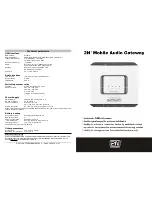
ZyWALL P1 User’s Guide
Chapter 8 Introduction to IPSec
127
NAT is incompatible with the
AH
protocol in both
Transport
and
Tunnel
mode. An IPSec
VPN using the
AH
protocol digitally signs the outbound packet, both data payload and
headers, with a hash value appended to the packet. When using
AH
protocol, packet contents
(the data payload) are not encrypted.
A NAT device in between the IPSec endpoints will rewrite either the source or destination
address with one of its own choosing. The VPN device at the receiving end will verify the
integrity of the incoming packet by computing its own hash value, and complain that the hash
value appended to the received packet doesn't match. The VPN device at the receiving end
doesn't know about the NAT in the middle, so it assumes that the data has been maliciously
altered.
IPSec using
ESP
in
Tunnel
mode encapsulates the entire original packet (including headers)
in a new IP packet. The new IP packet's source address is the outbound address of the sending
VPN gateway, and its destination address is the inbound address of the VPN device at the
receiving end. When using
ESP
protocol with authentication, the packet contents (in this case,
the entire original packet) are encrypted. The encrypted contents, but not the new headers, are
signed with a hash value appended to the packet.
Tunnel
mode
ESP
with authentication is compatible with NAT because integrity checks are
performed over the combination of the "original header plus original payload," which is
unchanged by a NAT device.
Transport
mode
ESP
with authentication is not compatible with
NAT, although NAT traversal provides a way to use
Transport
mode
ESP
when there is a
NAT router between the IPSec endpoints (See
for details).
Table 37
VPN and NAT
SECURITY PROTOCOL
MODE
NAT
AH
Transport
N
AH
Tunnel
N
ESP
Transport
N
ESP
Tunnel
Y
Summary of Contents for ZyXEL ZyWALL P1
Page 1: ...ZyWALL P1 Internet Security Appliance User s Guide Version 3 64 8 2005...
Page 9: ...ZyWALL P1 User s Guide 8 Customer Support...
Page 25: ...ZyWALL P1 User s Guide 24 List of Figures...
Page 39: ...ZyWALL P1 User s Guide 38 Chapter 1 Getting to Know Your ZyWALL...
Page 51: ...ZyWALL P1 User s Guide 50 Chapter 2 Introducing the Web Configurator...
Page 72: ...ZyWALL P1 User s Guide Chapter 3 Wizard Setup 71 Figure 22 VPN Wizard Complete...
Page 73: ...ZyWALL P1 User s Guide 72 Chapter 3 Wizard Setup...
Page 91: ...ZyWALL P1 User s Guide 90 Chapter 5 WAN Screens...
Page 129: ...ZyWALL P1 User s Guide 128 Chapter 8 Introduction to IPSec...
Page 151: ...ZyWALL P1 User s Guide 150 Chapter 9 VPN Screens...
Page 191: ...ZyWALL P1 User s Guide 190 Chapter 12 Static Route...
Page 215: ...ZyWALL P1 User s Guide 214 Chapter 13 Remote Management...
Page 248: ...ZyWALL P1 User s Guide Chapter 16 Maintenance 247 Figure 134 Restart Screen...
Page 249: ...ZyWALL P1 User s Guide 248 Chapter 16 Maintenance...
Page 269: ...ZyWALL P1 User s Guide 268 Chapter 18 Troubleshooting...
Page 289: ...ZyWALL P1 User s Guide 288 Appendix B IP Subnetting...
Page 295: ...ZyWALL P1 User s Guide 294 Appendix D PPTP...
Page 299: ...ZyWALL P1 User s Guide 298 Appendix E Triangle Route...
Page 329: ...ZyWALL P1 User s Guide 328 Appendix H Importing Certificates...
Page 331: ...ZyWALL P1 User s Guide 330 Appendix I Command Interpreter...
Page 337: ...ZyWALL P1 User s Guide 336 Appendix J Firewall Commands...
Page 341: ...ZyWALL P1 User s Guide 340 Appendix K NetBIOS Filter Commands...
Page 347: ...ZyWALL P1 User s Guide 346 Appendix M Brute Force Password Guessing Protection...
















































